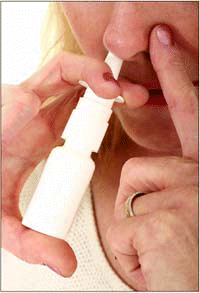As a result of these studies, Accentia BioPharmaceuticals, Inc., obtained a license from the Mayo Clinic to develop the amphotericin B treatment under the name SinuNase™. With an investigational new drug application, Accentia received fast track designation from the US Food and Drug Administration to test the treatment in clinical trials. Results will be unblinded this month.
Explore This Issue
March 2008
The Critics Are Skeptical
Meanwhile, critics of the fungal theory worry that practitioners might adopt use of an antifungal agent when only limited data are available to prove effectiveness. Others point to studies by two separate European groups that found that amphotericin B was ineffective in CRS treatment.
The issue is whether this is a universally effective or even appropriate treatment for all forms of CRS, said Bradley F. Marple, MD, Professor of Otolaryngology at University of Texas Southwestern Medical School in Dallas. Unfortunately, we have not yet fully characterized the pathogenesis of CRS. Based on the limited evidence that is currently available, many feel that amphotericin B may be appropriate for a subset of patients with CRS, but not all patients. At present, there are several attractive nonfungal etiologies under investigation that may also act as underlying triggers of CRS, such as bacterial superantigens, biofilms, and allergies. These are all things that could work independently or in conjunction with one another to drive the inflammatory process.
Dr. Marple further said that he was worried about an idiosyncrasy in the Mayo Clinic study. Although the Mayo team reported a lessening of mucosal thickening, there was no change in intranasal Alternaria and inflammatory cytokines failed to change in a statistically significant fashion. The fact that nasal carriage of Alternaria was not affected by this therapy appears to challenge the underlying hypothesis that inflammation is actually driven by fungus, he said.
Michael Weschta, MD, from the University of Ulm, Germany, is one of the European researchers who believes that amphotericin B shows no evidence of clinical improvement in CRS patients. His team used a randomized, double-blind, placebo-controlled trial with 78 CRS patients and found no significant benefits from eight weeks of amphotericin B nasal spray therapy (J Allergy Clin Immunol 2004;113:1122-8). The Weschta team further reported in a 2006 study that neither topical amphotericin B therapy nor fungal state before and after treatment had any significant influence on activation markers of nasal inflammatory cells in chronic rhinosinusitis (Arch Otolaryngol Head Neck Surg 2006;132:743-7).
Leave a Reply